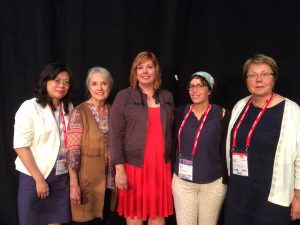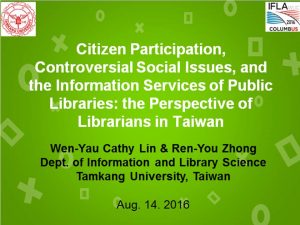Dear colleagues,
We want to thank you for your presence at the open session of the section Library Theory and Research (LTR), the sunday 14th of August 2016.
My colleagues, Milan Vasiljevic (Qatar national library) and Jennifer Weil Arms (University of south Carolina, USA) and I, Raphaëlle Bats (Enssib, France), were pleased to organize this session on the topic of participatory projects in libraries, as a way to connect communities.
Participation may be heard in different ways.
First, we can consider participation as information, deliberation or decision.
- Information (as a way to ensure and promote the participation of the inhabitants in the democracy) through the diffusion of controversial topics as we will see with the lecture of Cathy Lin Wen-Yau, that is also questioning the neutrality of libraries. The participation is here heard also as an exhortation to take part to the society, more than to take part to the library.
- Deliberation (as a way to discuss projects and to do it together) as we will see with the lectures of Dijana Sabolovic-Krajina and Andrea Wyman, that are questioning the collaboration and cooperation. The participation is heard here as a way for an institution as a library to fin dits place in the civil society, and to be more participant than participative.
- Decision (as a way to share the control of projects) as questioned in the text of Shannon Crawford Barniskis through an analysis of perception of spatial arrangement in maker-spaces that are questioning the representation of libraries as institution, authority and control places. The participation is heard here as something done by the public or the inhabitants.
Second, we can consider the participation with :
- On one hand, a political point of view, as a way to question the role of library in the form of the democracy. This is what we will hear in the text of Wen-Yau Cathy.
- On another hand, a social point of view, from solidarity to sociability. The lectures of Shannon, Andrea and Dijana are more focused on these aspects.
Finaly, we can consider participation on another angle that I have developed in some other texts, that is the one of the libraries’ issues in terms of knowledge, power and responsibility.
- About knowledge: participatory projects question the ability of libraries to reflect their communities, in terms of needs of information, but also in creation of information.
- About power: participatory projects question the ability of libraries to empower inhabitants.
- About responsibility: participatory projects question the ability of libraries to accept and assume their role of political actor in a moving society.
These three aspects will be approach in different ways trough the 4 lectures that we have listen.
You may find under this text the powerpoint of each lecture.
Thank you,
Raphaëlle Bats (Centre Gabriel Naudé, Enssib, France)
Lectures
Wen-Yau Cathy Lin : https://drive.google.com/file/d/0B4VzyYHMonGlcWtKRUtScDdKT0k/view?usp=sharing
Andrea Wyman : https://drive.google.com/file/d/0B4VzyYHMonGlS0huTTdSQ0lpVzg/view?usp=sharing
Dijana Sabolovic-Krajina : https://drive.google.com/file/d/0B4VzyYHMonGlMl9QNkhOSHFsVHM/view?usp=sharing
Shannon Crawford Barniskis : https://drive.google.com/file/d/0B4VzyYHMonGlNklLeG9ZNndlQkE/view?usp=sharing




